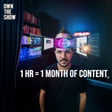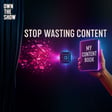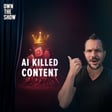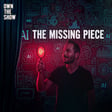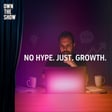
Strategies for AI-Driven Storytelling in Marketing
Welcome back to the AI-Driven Marketer. in this episode, Dan Sanchez shares a replay of a guest appearance I had on the business of storytelling podcast with Christophe Trapp. And I talked about a number of different ways that you can use AI to do better storytelling in your business from a strategic level to practical levels. And I even spent a lot of time talking about why the new ChatChupichi 0 one preview is a fantastic new model available to marketers in order to make these kinds of things happen. So without further ado, I'm going to now tap play on that episode for you to watch and listen to.
Timestamps:
00:00 Constant AI platform updates; OpenAI leads advancements.
03:28 New AI model excelling with reasoning ability.
07:17 Original content and thought leadership are essential.
09:42 Strong strategic narrative, needs minor improvements for fun.
13:38 Use AI to create engaging customer case studies.
18:04 AI improving productivity for content repurposing constraints.
21:34 Use AI to fix customer journey bottlenecks.
23:23 AI enables hyper-personalized, creative storytelling in marketing.



![What’s Your Authority Score? [The 5-Factor Test] image](https://media.zencastr.com/cdn-cgi/image/width=112,quality=85/image-files/630c9f06819f8b3dba5fa460/cfbaccba-f587-45de-a41f-e2c99c15e2a5.png)
![The Audience Growth Engine [Full Framework] image](https://media.zencastr.com/cdn-cgi/image/width=112,quality=85/image-files/630c9f06819f8b3dba5fa460/46b84fd1-e856-4687-9aee-6b4a7e0bc7ff.png)


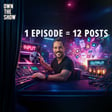
![The "Dream 100" Execution Plan [Google Sheet System] image](https://media.zencastr.com/cdn-cgi/image/width=112,quality=85/image-files/630c9f06819f8b3dba5fa460/fcd89374-76a4-4e58-a2e3-2bb7ddda4364.png)
